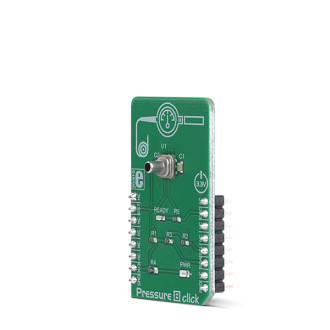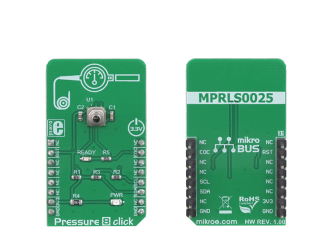
We strongly encourage users to use Package manager for sharing their code on Libstock website, because it boosts your efficiency and leaves the end user with no room for error. [more info]

Rating:
Author: MIKROE
Last Updated: 2019-02-18
Package Version: 1.0.0.0
mikroSDK Library: 1.0.0.0
Category: Pressure
Downloaded: 3014 times
Not followed.
License: MIT license
Pressure 8 Click is an accurate and fully calibrated pressure sensor, equipped with the MPR series integrated piezoresistive silicon pressure sensor IC.
Do you want to subscribe in order to receive notifications regarding "Pressure 8 click" changes.
Do you want to unsubscribe in order to stop receiving notifications regarding "Pressure 8 click" changes.
Do you want to report abuse regarding "Pressure 8 click".


Library Description
The library initializes and defines the I2C bus driver and drivers that offer a choice for writing data in register and reads data form register. The library includes function for read Pressure data in mBar/hPa/kPa/Torr or mmHg. The user also has the function for set PSI Range, function for reset device, function for get read Satatus and function for read interrupt state.
Key functions:
float pressure8_getPressure(uint8_t pressureIn) - Functions for get Pressure data.void pressure8_reset() - Functions for reset device.void pressure8_setPSIRange(float PSI_min, float PSI_max) - Functions for set PSI range.Examples description
The application is composed of the three sections :
void applicationTask()
{
float PressureData;
char demoText[ 50 ];
PressureData = pressure8_getPressure(_PRESSURE8_DATA_IN_mBar);
FloatToStr(pressureData, demoText);
mikrobus_logWrite(" Pressure data : ", _LOG_TEXT);
mikrobus_logWrite(demoText, _LOG_TEXT);
mikrobus_logWrite(" mBar", _LOG_LINE);
Delay_ms( 1000 );
}
Other mikroE Libraries used in the example:
I2CAdditional notes and informations
Depending on the development board you are using, you may need USB UART click, USB UART 2 clickor RS232 click to connect to your PC, for development systems with no UART to USB interface available on the board. The terminal available in all MikroElektronika compilers, or any other terminal application of your choice, can be used to read the message.